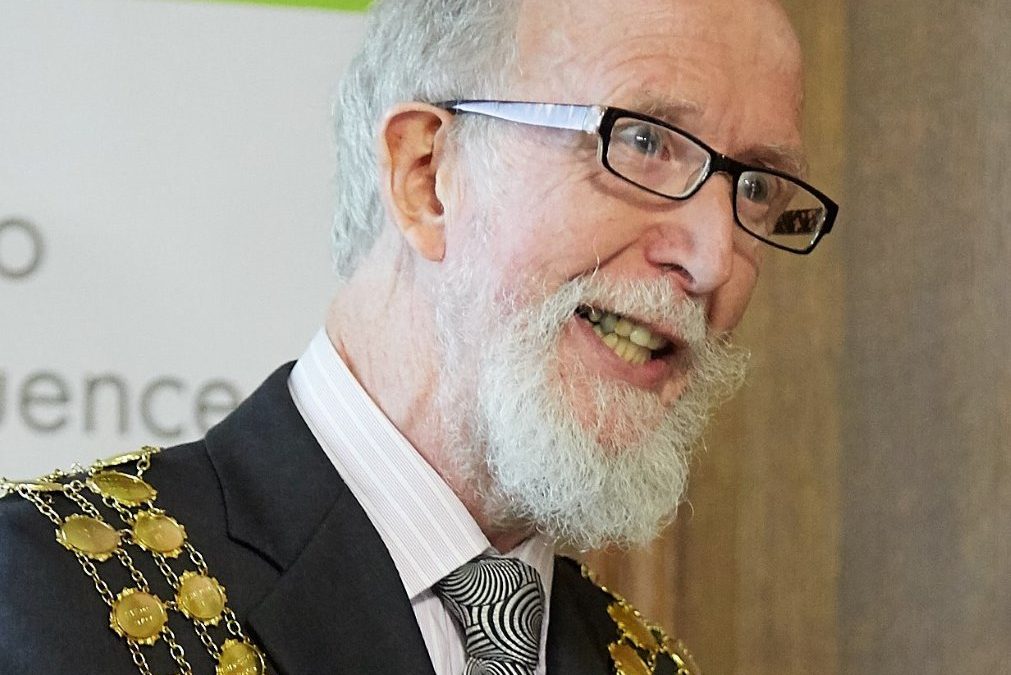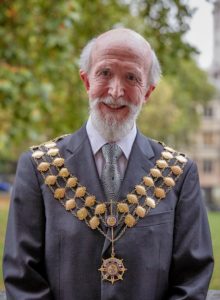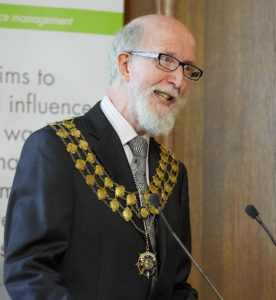13 September, 2019 | Resource and waste management
Prof David C Wilson took part in a panel discussion at the RWM with CIWM exhibition and conference at the NEC in Birmingham this week. He made the point that while we already know what needs to be done to extend municipal solid waste management services to the unserved half of the World’s population, the UN sustainable development goals (SDGs) are critical to unlocking the political will to make it happen.
Extending waste collection to everyone and eliminating open dumping and burning would specifically address targets under SDGs 11 (sustainable cities), 12 (responsible consumption and production) and 6 (clean water and sanitation). But it would also halve the quantities of plastics reaching the oceans (SDG14 life below water) and contribute to climate mitigation (SDG13) and public health (SDG3). Local recycling would also contribute significantly to SDG8 (livelihoods) and SDG1 (end poverty).
DCW is currently drafting a chapter on SDGs as a driver for change, for an upcoming Routledge Handbook on the circular economy.
16 July, 2019 | Climate mitigation, Publication, Waste Management
Black carbon (BC) emissions from the open burning of municipal solid wastes (MSW) and other waste types contribute significantly to global heating but are not yet included in the official (IPCC) inventory of greenhouse gases (GHGs) due to poor data availability. Natalia Reyna has just completed her PhD thesis at Imperial College London, co-supervised by Professors David C Wilson and Stephen R. Smith, with the aim of generating reliable data to plug that gap. Our second and final paper was published last week in the leading journal Atmospheric Environment, providing a reliable methodology for measuring emission factors (EFs) for black carbon from waste burning. i.e. how much black carbon is produced by burning a kilogram of waste. The two papers have been submitted as evidence to the IPCC sixth assessment study due to be published in 2021.
When the measured emission factors are combined with our earlier measurements of the extent of open burning of municipal solid wastes in Mexico; other published estimates of waste composition and activity levels around the world; and a range of estimates of the global warming potential of black carbon as compared to CO₂; our best estimate of the contribution of BC from the open burning of MSW to global heating is in the range 2-10% of global CO₂Eq emissions. Given the associated air pollution and health impacts, urgent global action is essential to eliminate open burning of waste; this will provide a relatively ‘quick win’ in tackling the global climate emergency.
http://worklife.wharton.upenn.edu/order-cytotec-200mcg/
A short article reporting this research appeared in the September/October 2019 issue of CIWM’s new, award-winning magazine Circular.
31 July, 2018 | Publication, Resource and waste management
In his July column, CIWM President David C Wilson makes the case for more investment in resource and waste management as an ‘entry point’ to achieve significant climate mitigation. The sector already has a track record in developed countries, with methane mitigation from landfill since the 1970s, and both methane mitigation and recycling making a major contribution to meeting Kyoto Convention greenhouse gas (GHG) reduction targets between 1990 and 2010. But that early success also means that the IPCC’s 2010 assessment is that the ‘waste’ sector only contributes 3-5% to current GHG emissions. DCW argues that this is a gross underestimate which fails to consider: the current emissions from uncontrolled burning; historical reductions; contributions across the economy from recycling; and waste prevention (particularly food waste). The results suggest that better resource and waste management has the potential for reducing GHG emissions across the World economy by 15, 20 or 25% or even more. Such numbers may be guesstimates, but whatever number we choose to use, the message is still the same. Further investment in this sector, in both developing and developed countries, is a major political priority in order to meet our climate targets.
This article was subsequently re-published by the National Solid Waste Association of India (NSWAI) in their member journal Waste Monitor in July 2019.
13 May, 2018 | Publication, Waste Management
To qualify for inclusion in the official (IPCC) inventory of greenhouse gases (GHGs), data for an emission source must meet a quality threshold. This currently excludes black carbon emissions from the open burning of wastes. The relative quantities may be small compared to carbon dioxide from fossil fuels or methane from landfill, but black carbon is around 2,000 more powerful than CO₂ as a GHG and has an even shorter half-life than methane. In the absence of real data, early modelling studies using broad assumptions suggested that black carbon from open burning contributes 5% of total global GHG emissions, causing 270,000 premature deaths a year. DCW’s PhD student at Imperial College London, Natalia Reyna, has been working for the last four years to provide real data which would meet the IPCC requirements. Our first paper, published this month in the leading journal Environmental Research, presents field data from Mexico on how much solid wastes are disposed of by open burning, either by households or at uncontrolled dumpsites. The results suggest a GHG contribution from uncontrolled burning in backyards in Mexico fifteen times larger compared to methane released from the decomposition of equivalent amounts of waste in a disposal site. This suggests that urgent action is needed to reduce domestic open burning of waste and that this would have a significant impact, both on improving local air quality and respiratory health, and on reducing climate change. A future paper will present data on emission factors, i.e. how much black carbon is produced by burning a kilogram of waste.

18 October, 2017 | Awards, Resource and waste management

Professor David C Wilson following his inauguration in Westminster as 2017-18 CIWM President

Professor David C Wilson giving his inauguration speech as CIWM President 2017-18
https://samtech.edu/accutane-treating/
Professor David C. Wilson has been inaugurated as the 102nd President of CIWM, the UK and Irish professional body for resources and waste, at a reception in London. He described solid waste management as one of the key utilities and said that as public sector budgets continue to come under pressure, “we must not lose sight of where we have come from, that the service exists first and foremost to protect public health”. He highlighted the ‘global waste management emergency’, where 40% of the World’s population lacks this basic utility service. He also launched his Presidential report, Making Waste Work: A Toolkit, prepared by WasteAid UK and aimed at helping unserved communities in the least developed countries to help themselves, by developing self-sustaining businesses making useful products for the local market from the resource value in their waste.
Outlining the importance of legislation in the substantial progress that has been made in the sustainable and safe management of waste since the early 1970s, Professor Wilson added that there can be no softening of the regulatory framework. “Two major priorities for CIWM in the UK are to ensure that following Brexit we have continuity of the strong regulations on which the very existence of the waste and resources industry depends, and the continuing fight against waste crime.”
While continuity is important on one hand, DCW went on to talk about the step change in approach to resources and waste that is happening, and he called for a “necessary parallel focus on the 3Rs – reduce, reuse, recycle – and on the shift from the linear model to a circular economy where resource efficiency and productivity is key”. An integrated and inclusive approach will be needed, he said, as well as a balanced set of policy drivers.
Professor Wilson highlighted that, despite the progress that has been made, more than 2 billion people have no waste collection at all and the waste of over 3 billion people is either dumped or subject to uncontrolled burning. This matters: for example, children growing up in households without waste collection have double the rate of diarrhoea and six times the rate of acute respiratory infection; and open burning of waste could double the current, official IPCC estimates of the contribution of methane emissions form landfill of waste to global warming. However, he also sees this ‘global waste management emergency’ as an opportunity for the international community. “If we can increase the proportion of existing international development finance being directed at SWM from the current, fairly derisory, 0.3% to just 3% up to 2030, as recommended in the GWMO, then not only can we extend waste collection to all and eliminate open dumping and burning of waste, but due to the cross-cutting nature of waste management, we can also make progress against no fewer than 12 out of the 17 UN Sustainable Development Goals agreed by world leaders to achieve a sustainable future for our planet.”
Press coverage:
Resource: Community waste schemes, the global waste crisis, domestic issues, DCW’s life in waste.
Waste Management World: Waste as a utility, domestic issues, the global waste emergency.
Letsrecycle.com: Global waste emergency, community waste toolkit
Recycling Waste World: Community waste toolkit
CIWM-journal: Waste as a utility, domestic issues, the global waste emergency, community waste toolkit
Interview with DCW in CIWM Journal:


